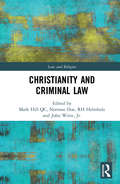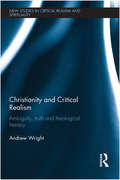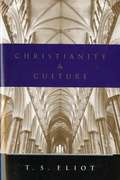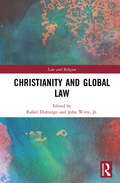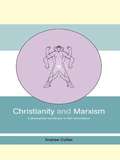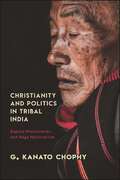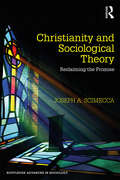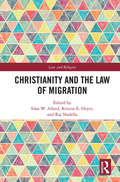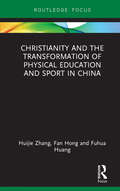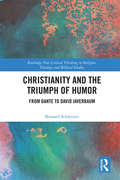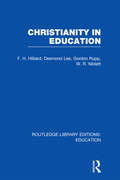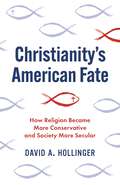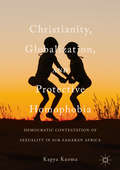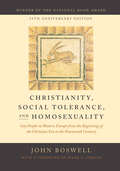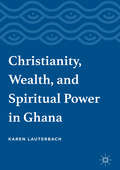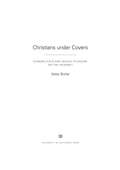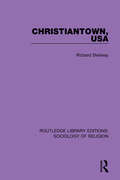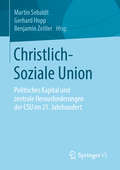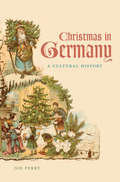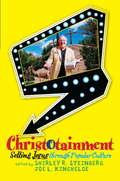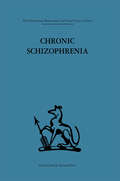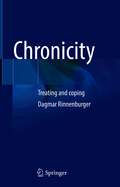- Table View
- List View
Christianity and Criminal Law (Law and Religion)
by John Witte Jr Norman Doe Mark Hill Qc Rh HelmholzThis collection, by leading legal scholars, judges and practitioners, together with theologians and church historians, presents historical, theological, philosophical and legal perspectives on Christianity and criminal law. Following a Preface by Lord Judge, formerly Lord Chief Justice of England and Wales, and an introductory chapter, the book is divided into four thematic sections. Part I addresses the historical contributions of Christianity to criminal law drawing on biblical sources, early church fathers and canonists, as far as the Enlightenment. Part II, titled Christianity and the principles of criminal law, compares crime and sin, examines concepts of mens rea and intention, and considers the virtue of due process within criminal justice. Part III looks at Christianity and criminal offences, considering their Christian origins and continuing relevance for several basic crimes that every legal system prohibits. Finally, in Part IV, the authors consider Christianity and the enforcement of criminal law, looking at defences, punishment and forgiveness. The book will be an invaluable resource for students and academics working in the areas of Law and Religion, Legal Philosophy and Theology.
Christianity and Critical Realism: Ambiguity, Truth and Theological Literacy (New Studies in Critical Realism and Spirituality (Routledge Critical Realism))
by Andrew WrightOne of the key achievements of critical realism has been to expose the modernist myth of universal reason, which holds that authentic knowledge claims must be objectively ‘pure’, uncontaminated by the subjectivity of local place, specific time and particular culture. Wright aims to address the lack of any substantial and sustained engagement between critical realism and theological critical realism with particular regard to: (a) the distinctive ontological claims of Christianity; (b) their epistemic warrant and intellectual legitimacy; and (c) scrutiny of the primary source of the ontological claims of Christianity, namely the historical figure of Jesus of Nazareth. As such, it functions as a prolegomena to a much needed wider debate, guided by the under-labouring services of critical realism, between Christianity and various other religious and secular worldviews. This important new text will help stimulate a debate that has yet to get out of first gear. This book will appeal to academics, graduate and post-graduate students especially, but also Christian clergy, ministers and informed laity, and members of the general public concerned with the nature of religion and its place in contemporary society.
Christianity and Culture: The Idea of a Christian Society and Notes Towards the Definition of Culture
by T. S. EliotTwo long essays: "The Idea of a Christian Society" on the direction of religious thought toward criticism of political and economic systems; and "Notes towards the Definition of Culture" on culture, its meaning, and the dangers threatening the legacy of the Western world.
Christianity and Global Law (Law and Religion)
by John Witte Jr. Rafael DomingoThis book explores both historical and contemporary Christian sources and dimensions of global law and includes critical perspectives from various religious and philosophical traditions. Two dozen leading scholars discuss the constituent principles of this new global legal order historically, comparatively, and currently. The first part uses a historical-biographical approach to study a few of the major Christian architects of global law and transnational legal theory, from St. Paul to Jacques Maritain. The second part distills the deep Christian sources and dimensions of the main principles of global law, historically and today, separating out the distinct Catholic, Protestant, and Orthodox Christian contributions as appropriate. Finally, the authors address a number of pressing global issues and challenges, where a Christian-informed legal perspective can and should have deep purchase and influence. The work makes no claim that Christianity is the only historical shaper of global law, nor that it should monopolize the theory and practice of global law today. But the book does insist that Christianity, as one of the world’s great religions, has deep norms and practices, ideas and institutions, prophets and procedures that can be of benefit as the world struggles to find global legal resources to confront humanity’s greatest challenges. The volume will be an essential resource for academics and researchers working in the areas of law and religion, transnational law, legal philosophy, and legal history.
Christianity and Marxism: A Philosophical Contribution to their Reconciliation
by Andrew CollierAndrew Collier analyses recent cooperation between Christianity and Marxism after earlier years of antagonism. He first discusses the nature of Christianity and Marxism and their place amongst contemporary world views, before looking at areas of apparent conflict and possible reconciliation. This groundbreaking work will be of interest to those involved in philosophy, theology, politics and Marxism.
Christianity and Politics in Tribal India: Baptist Missionaries and Naga Nationalism
by G. Kanato ChophyChronicles the astonishing and counterintuitive spread of Christianity among a group of previously isolated tribes in a remote and hilly part of Northeastern India.Through an ethnohistorical study of the Nagas-a congeries of tribes inhabiting the Indo-Myanmar frontier-this book explores an unusually interesting region of India that is all too often seen as peripheral. G. Kanato Chophy provides a distinct vantage point for understanding the Nagas in relation to colonialism, missionary encounters, identity politics, and cultural change, all seamlessly woven around American Baptist mission history in this region. The book also analyses India's cacophonous postindependence democracy in order to delineate multifaith issues, multiculturalism, and ethnicity-based political movements.Within the West, episodic memories of the "Great Awakening," a significant landmark in the history of Protestantism, have faded into archival records. But among the Nagas of the Indo-Myanmar highlands, Baptist Christianity persists as the dominant religion, influencing the daily lives of nearly three million people. Focusing variously on evangelical faith, missionary zeal, ethnic identities, political struggle, and complex culture wars, Christianity and Politics in Tribal India is an original and major study of how Protestant missions changed the history and destiny of a tribal community in one of the unlikeliest regions of South Asia.
Christianity and Social Work: Readings on the Integration of Christian Faith and Social Work Practice (2nd edition)
by Beryl Hugen T. Laine ScalesThe potential contributions that being a Christian in social work can make to the competent and holistic practice of professional social work and, not incidentally, to the furtherance of the gospel of Jesus Christ and the growth of His Kingdom.
Christianity and Sociological Theory: Reclaiming the Promise (Routledge Advances in Sociology)
by Joseph A. ScimeccaThis book offers a history of sociological theory from a Christian perspective, tracing the origins of sociology from the beginnings of Western science as introduced by the Scholastics of the twelfth century, which, when combined with their emphasis on rationality, led to the Enlightenment "science of man"—an emphasis that eventually resulted in sociology, which combined empiricism and a Christian moral philosophy. With chapters focusing on the Scholastics, the Enlightenment, the rise of sociology in France, Germany, and the United States, and the legacy of Positivism, Christianity and Sociological Theory shows how the emphasis on moral philosophy was eventually lost as sociology rejected Christian underpinnings, resulting in what can only be described as an extremely limited sociology. A rigorous exploration of the trajectory of the discipline from its Christian origins, this volume reveals the potential that exists for sociology in an era of postmodern thought to reclaim its promise through a re-introduction of Christianity.
Christianity and the Law of Migration (Law and Religion)
by Silas W. Allard; Kristin E. Heyer; Raj NadellaThis collection brings together legal scholars and Christian theologians for an interdisciplinary conversation responding to the challenges of global migration. Gathering 14 leading scholars from both law and Christian theology, the book covers legal perspectives, theological perspectives, and key concepts in migration studies. In Part 1, scholars of migration law and policy discuss the legal landscape of migration at both the domestic and international level. In Part 2, Christian theologians, ethicists, and biblical scholars draw on the resources of the Christian tradition to think about migration. In Part 3, each chapter is co-authored by a scholar of law and a scholar of Christian theology, who bring their respective resources and perspectives into conversation through a conversation on key themes within migration studies. The work provides a truly interdisciplinary introduction to the topic of migration for those who are new to the subject; an opportunity for immigration lawyers and legal scholars to engage Christian theology; an opportunity for pastors and Christian theologians to engage law; and new insights on key frameworks for scholars who are already committed to the study of migration.
Christianity and the Transformation of Physical Education and Sport in China (Routledge Focus on Sport, Culture and Society)
by Fan Hong Fuhua Huang Huijie ZhangDespite the popularity of sport in contemporary China, the practice of physical education is not indigenous to its culture. Strenuous physical activity was traditionally linked to low class and status in the pre-modern Chinese society. The concept of modern PE was introduced to China by Western Christian missionaries and directors of the Young Men’s Christian Association (YMCA). It then grew from a tool for Christian evangelism to a strategic instrument in Chinese nation-building. This book examines the transformation of Chinese attitudes toward PE and sport, drawing on the concepts of cultural imperialism and nationalism to understand how an imported Western activity became a key aspect of modernization for the Chinese state. More specifically, it looks at the relationship between Christianity and the rise of Chinese nationalism between 1840 and 1937. Combining historical insight with original research, this book sheds new light on the evolution of PE and sport in modern China. It is fascinating reading for all those with an interest in sports history, Chinese culture and society, Christianity, physical education or the sociology of sport.
Christianity and the Triumph of Humor: From Dante to David Javerbaum (Routledge New Critical Thinking in Religion, Theology and Biblical Studies)
by Bernard SchweizerThis book traces the development of religious comedy and leverages that history to justify today’s uses of religious humor in all of its manifestations, including irreverent jokes. It argues that regulating humor is futile and counterproductive, illustrating this point with a host of comedic examples. Humor is a powerful rhetorical tool for those who advocate and for those who satirize religious ideals. The book presents a compelling argument about the centrality of humor to the story of Western Christianity’s cultural and artistic development since the Middle Ages, taking a multi-disciplinary approach that combines literary criticism, religious studies, philosophy, theology, and social science. After laying out the conceptual framework in Part 1, Part 2 analyzes key works of religious comedy across the ages from Dante to the present, and it samples the breadth of contemporary religious humor from Brad Stine to Robin Williams, and from Monty Python to South Park. Using critical, historical, and conceptual lenses, the book exposes and overturns past attempts by church authorities, scholars, and commentators to limit and control laughter based on religious, ideological, or moral criteria. This is a unique look into the role of humor and comedy around religion. It will, therefore, be of great interest to scholars of Religious Studies, Humor Studies, and the Sociology of Religion.
Christianity in Education: The Hibbert Lectures 1965 (Routledge Library Editions: Education)
by Desmond Lee F. H. Hilliard Gordon Rupp W. R. NiblettThe Christian churches have frequently pioneered educational advances – from the seventh century down to the nineteenth. Schools, universities and colleges of education stand as tangible evidence of these efforts. Do all these ventures belong merely to educational history – relics of the days when Christianity was influential enough to play a leading part in education? Or has Christianity still a distinctive contribution to make to educational thought and practice? The educationalists who contributed to the Hibbert Lectures of 1965 are convinced that it has. They examine the nature of this contribution and show how it is to be made a time when education seems to be mainly influenced by secular rather than religious assumptions and aims. The six lectures fall into two main parts. Christianity in the schools is the theme of the first three; Christianity in higher education that of the last three.
Christianity's American Fate: How Religion Became More Conservative and Society More Secular
by David A. HollingerTracing the rise of evangelicalism and the decline of mainline Protestantism in American religious and cultural lifeHow did American Christianity become synonymous with conservative white evangelicalism? This sweeping work by a leading historian of modern America traces the rise of the evangelical movement and the decline of mainline Protestantism’s influence on American life. In Christianity’s American Fate, David Hollinger shows how the Protestant establishment, adopting progressive ideas about race, gender, sexuality, empire, and divinity, liberalized too quickly for some and not quickly enough for others. After 1960, mainline Protestantism lost members from both camps—conservatives to evangelicalism and progressives to secular activism. A Protestant evangelicalism that was comfortable with patriarchy and white supremacy soon became the country’s dominant Christian cultural force.Hollinger explains the origins of what he calls Protestantism’s “two-party system” in the United States, finding its roots in America’s religious culture of dissent, as established by seventeenth-century colonists who broke away from Europe’s religious traditions; the constitutional separation of church and state, which enabled religious diversity; and the constant influx of immigrants, who found solidarity in churches. Hollinger argues that the United States became not only overwhelmingly Protestant but Protestant on steroids. By the 1960s, Jews and other non-Christians had diversified the nation ethnoreligiously, inspiring more inclusive notions of community. But by embracing a socially diverse and scientifically engaged modernity, Hollinger tells us, ecumenical Protestants also set the terms by which evangelicals became reactionary.
Christianity, Globalization, and Protective Homophobia: Democratic Contestation of Sexuality in Sub-Saharan Africa
by Kapya KaomaThis book examines how socio-political assumptions inform and shape the contestation of sexuality on the African continent. Across Africa, the idea that homosexuality is un-African, un-Christian, un-natural, and un-cultural is now well established. This book analyzes politically- and religiously-inspired protective homophobia within the context of Africa's socioeconomic and political place in the global community. The author builds upon on-the-ground research and his groundbreaking previous studies on the cultural politics of globalization in Africa to present a wide, complex, and interdisciplinary understanding of Africa's sexual politics.
Christianity, Social Tolerance, and Homosexuality: Gay People in Western Europe from the Beginning of the Christian Era to the Fourteenth Century
by John Boswell“What makes this work so exciting is not simply its content . . . but its revolutionary challenge to . . . Western culture’s most familiar moral assumptions.” —NewsweekJohn Boswell’s National Book Award–winning study of the history of attitudes toward homosexuality in the early Christian West was a groundbreaking work that challenged preconceptions about the Church’s past relationship to its gay members—among them priests, bishops, and even saints—when it was first published thirty-five years ago. The historical breadth of Boswell’s research (from the Greeks to Aquinas) and the variety of sources consulted make this one of the most extensive treatments of any single aspect of Western social history.Now in this thirty-fifth anniversary edition with a new foreword by leading queer and religious studies scholar Mark D. Jordan, Christianity, Social Tolerance, and Homosexuality is still fiercely relevant. This landmark book helped form the disciplines of gay and gender studies, and it continues to illuminate the origins and operations of intolerance as a social force.“Truly groundbreaking work. Boswell reveals unexplored phenomena with an unfailing erudition.” —Michel Foucault“Revolutionary. . . .sets a standard of excellence that one would have thought impossible in the treatment of an issue so large, uncharted and vexed. . . . Improbably as it might seem, this work of unrelenting scholarship and high intellectual drama is also thoroughly entertaining.” —New York Times Book Review“One day, when all churches accept the presence and achievements of gay people with approbation instead of denial or disapproval, Boswell will in no small way be responsible.” —Gay & Lesbian Review
Christianity, Wealth, and Spiritual Power in Ghana
by Karen LauterbachThis book centers around mid-level charismatic pastors in Ghana. Karen Lauterbach analyzes pastorship as a pathway to becoming small "big men" and achieving status, wealth, and power in the country. The volume investigates both the social processes of becoming a pastor and the spiritual dimensions of how power and wealth are conceptualized, achieved, and legitimized in the particular context of Asante in Ghana. Lauterbach integrates her analysis of charismatic Christianity with a historically informed examination of social mobility--how people in subordinate positions seek to join up with power. She explores how the ideas and experiences surrounding the achievement of wealth and performance of power are shaped and re-shaped. In this way, the book historicizes current expressions of charismatic Christianity in Ghana while also bringing the role of religion and belief to bear on our understanding of wealth and power as they function more broadly in African societies.
Christians under Covers
by Kelsy BurkeChristians under Covers shifts how scholars and popular media talk about religious conservatives and sex. Moving away from debates over homosexuality, premarital sex, and other perceived sexual sins, Kelsy Burke examines Christian sexuality websites to show how some evangelical Christians use digital media to promote the idea that God wants married, heterosexual couples to have satisfying sex lives. These evangelicals maintain their religious beliefs while incorporating feminist and queer language into their talk of sexuality--encouraging sexual knowledge, emphasizing women's pleasure, and justifying marginal sexual practices within Christian marriages. This illuminating ethnography complicates the boundaries between normal and subversive, empowered and oppressed, and sacred and profane.
Christiantown, USA (Routledge Library Editions: Sociology of Religion #1)
by Richard StellwayAre Christian families more - or less - strong than other families? How important is sexual satisfaction to marital happiness? What impact does the arrival of children have on a marriage? How does income affect marital satisfaction? What pressures confront employed wives and their families and how content are these women with their marriages?To accurately assess the influence of religion on the marriages of churchgoers, this book, first published in 1990, considers the significance of other important forces as well - level of education, job satisfaction, income, sex life, patterns of decision making, coping strategies, and the demands of parenting. While most studies have been content to assess religion's impact by looking at church membership or church attendance, this book looks at several facets of religiosity in an effort to understand more clearly just how and when religion affects marriage quality and whether its impact is positive or negative.A final concern of the book is to assess how the current generation of couples is adapting to intergenerational changes such as increased occupational status, more egalitarian patterns of decision-making, and smaller families. It examines the role modifications and coping strategies that couples are employing to deal with these changes and with the demands that accompany them.
Christlich-Soziale Union: Politisches Kapital und zentrale Herausforderungen der CSU im 21. Jahrhundert
by Martin Sebaldt Gerhard Hopp Benjamin ZeitlerDie CSU steht vor großen Herausforderungen: Die Partei muss Reformen entschlossen anpacken, um dauerhaft zukunftsfähig zu bleiben. Zugleich muss sie ihre bewährten politischen Stärken pflegen und ihren christlich-sozialen, bayerischen Markenkern bewahren. Die Studie unternimmt daher eine umfassende Bestandsaufnahme der Partei, die ihre Stärken und Schwächen systematisch gegeneinander abwägt. Diese Gesamtbilanz bietet dann auch Impulse für Reformmaßnahmen, um die CSU dauerhaft zukunftsfähig zu machen.
Christmas in Germany: A Cultural History
by Joe PerryFor poets, priests, and politicians--and especially ordinary Germans--in the nineteenth and twentieth centuries, the image of the loving nuclear family gathered around the Christmas tree symbolized the unity of the nation at large. German Christmas was supposedly organic, a product of the winter solstice rituals of pagan "Teutonic" tribes, the celebration of the birth of Jesus, and the age-old customs that defined German character. Yet, as Joe Perry argues, Germans also used these annual celebrations to contest the deepest values that held the German community together: faith, family, and love, certainly, but also civic responsibility, material prosperity, and national belonging. This richly illustrated volume explores the invention, evolution, and politicization of Germany's favorite national holiday. According to Perry, Christmas played a crucial role in public politics, as revealed in the militarization of “War Christmas” during World War I and World War II, the Nazification of Christmas by the Third Reich, and the political manipulation of Christmas during the Cold War. Perry offers a close analysis of the impact of consumer culture on popular celebration and the conflicts created as religious, commercial, and political authorities sought to control the holiday's meaning. By unpacking the intimate links between domestic celebration, popular piety, consumer desires, and political ideology, Perry concludes that family festivity was central in the making and remaking of public national identities. For poets, priests, and politicians--and especially ordinary Germans--in the nineteenth and twentieth centuries, the image of the loving nuclear family gathered around the Christmas tree symbolized the unity of the nation at large. German Christmas was supposedly organic, a product of the winter solstice rituals of pagan "Teutonic" tribes, the celebration of the birth of Jesus, and the age-old customs that defined German character. Yet, as Joe Perry argues, Germans also used these annual celebrations to contest the deepest values that held the German community together: faith, family, and love, certainly, but also civic responsibility, material prosperity, and national belonging. This richly illustrated volume explores the invention, evolution, and politicization of Germany's favorite national holiday. According to Perry, Christmas played a crucial role in public politics, as revealed in the militarization of “War Christmas” during World War I and World War II, the Nazification of Christmas by the Third Reich, and the political manipulation of Christmas during the Cold War. Perry offers a close analysis of the impact of consumer culture on popular celebration and the conflicts created as religious, commercial, and political authorities sought to control the holiday's meaning. By unpacking the intimate links between domestic celebration, popular piety, consumer desires, and political ideology, Perry concludes that family festivity was central in the making and remaking of public national identities.
Christotainment
by Shirley R. Steinberg Joe L. KincheloeFor more than two thousand years Christian expansion and proselytizing was couched in terms of "defending the faith." Until recently in the United States, much of that defense came in the form of reactions against the "liberal" influences channeled through big-corporate media such as popular music, Hollywood movies, and network and cable television. But the election of Ronald Reagan as a Hollywood President introduced Christian America to the tools of advertising and multimedia appeals to children and youth to win new believers to God's armies. Christotainment examines how Christian fundamentalism has realigned its armies to combat threats against it by employing the forces it once considered its chief enemies: the entertainment media, including movies, television, music, cartoons, theme parks, video games, and books. Invited contributors discuss the critical theoretical frameworks of top-selling devices within Christian pop culture and the appeal to masses of American souls through the blessed marriage of corporatism and the quest for pleasure.
Christotainment
by Shirley R. SteinbergFor more than two thousand years Christian expansion and proselytizing was couched in terms of "defending the faith. " Until recently in the United States, much of that defense came in the form of reactions against the "liberal" influences channeled through big-corporate media such as popular music, Hollywood movies, and network and cable television. But the election of Ronald Reagan as a Hollywood President introduced Christian America to the tools of advertising and multimedia appeals to children and youth to win new believers to God's armies. Christotainment examines how Christian fundamentalism has realigned its armies to combat threats against it by employing the forces it once considered its chief enemies: the entertainment media, including movies, television, music, cartoons, theme parks, video games, and books. Invited contributors discuss the critical theoretical frameworks of top-selling devices within Christian pop culture and the appeal to masses of American souls through the blessed marriage of corporatism and the quest for pleasure.
Chronic Schizophrenia (International Behavioural And Social Sciences Ser. #Vol. 58)
by Thomas Freeman John L Cameron Andrew McGHIETavistock Press was established as a co-operative venture between the Tavistock Institute and Routledge & Kegan Paul (RKP) in the 1950s to produce a series of major contributions across the social sciences. This volume is part of a 2001 reissue of a selection of those important works which have since gone out of print, or are difficult to locate. Published by Routledge, 112 volumes in total are being brought together under the name The International Behavioural and Social Sciences Library: Classics from the Tavistock Press. Reproduced here in facsimile, this volume was originally published in 1958 and is available individually. The collection is also available in a number of themed mini-sets of between 5 and 13 volumes, or as a complete collection.
Chronicity: Treating and coping
by Dagmar RinnenburgerThis book comprehensively and critically discusses chronicity as a crucial challenge for the future of medicine in an era of aging populations and the steady growth of non-communicable comorbidities. It describes how health systems that are still designed and based on the treatment of acute diseases are suffering from crowded emergency rooms and growing conflicts between patients, while medical staff increasingly face frustration and the risk of burn-out. The author not only shares her own clinical and personal experience in the care of end stage COPD or ALS patients with respiratory insufficiency, but also explores how primary care, incremental medicine and initiative medicine can improve the care provided for these patients. In turn, the book examines how developing countries are facing the chronicity issue in their daily struggles with communicable diseases like diarrhea and infections, and with non-communicable ones like obesity, diabetes and asthma. It also discusses the cost-related challenges that could accompany a possible paradigm shift from chronic to curable status, as was the case with hepatitis C. Due to the inevitable link between chronicity and end of life, the author tactfully addresses palliative care, focusing on the importance of shared decision-making as well as a full awareness of the future scenarios. Uniquely reflecting life-long clinical experience and stimulating discussion on a highly topical issue, this book appeals to a wide readership, from health professionals through caregivers to patients with chronic conditions.
Chronicles of a Global City: Speculative Lives and Unsettled Futures in Bengaluru
by Malini RanganathanTracking Bengaluru&’s dramatic urban transformation through the entanglements of finance, land frenzy, real estate volatility, and livelihood upheavals Over the past two decades, Bengaluru&’s exploding real estate sector and massive infrastructure investments have led to land speculation targeting working-class neighborhoods and agricultural land for development. Chronicles of a Global City turns Bengaluru inside out to examine its &“world-city&” transformation that stimulated rapid urbanization and unbounded growth. Moving the spotlight away from the urban elites and &“new middle class,&” this book explores how people caught up in the whirlwinds of change in Bengaluru—from construction laborers, street vendors, domestic workers, and platform delivery workers to small-time property brokers, petty landlords, and local politicians—experience, struggle, aspire, invent, strive, and speculate to make a livable city for themselves. Grounded in long-term ethnographic research and activist experiences, Chronicles of a Global City vividly illuminates the multifaceted entanglements of finance capital, real estate markets, livelihood struggles, and fraying ecologies in urban and peri-urban Bengaluru. Its anchoring concept, &“speculative urbanism,&” provides a powerful, innovative lens for understanding the risk-laden practices of leveraging land, labor, and resources for the promise of future profit. Contributors: Hemangini Gupta, Pierre Hauser, Priyanka Krishna, Eesha Kunduri, Kaveri Medappa, Usha Rao, Shaheen Shasa, Swathi Shivanand, Vinay K. Sreenivasa.
